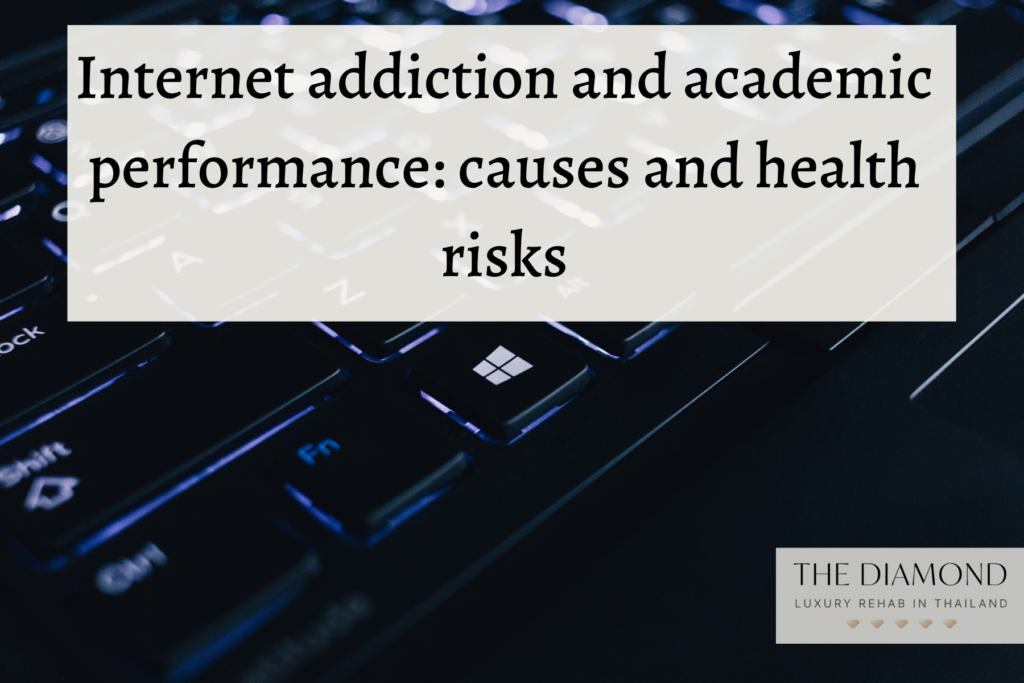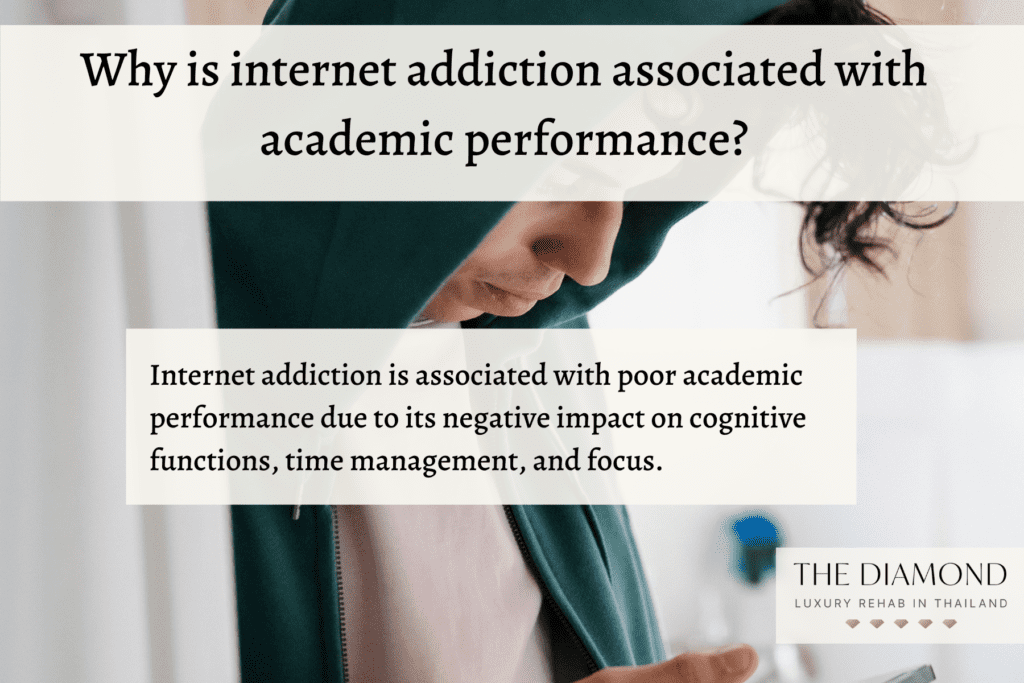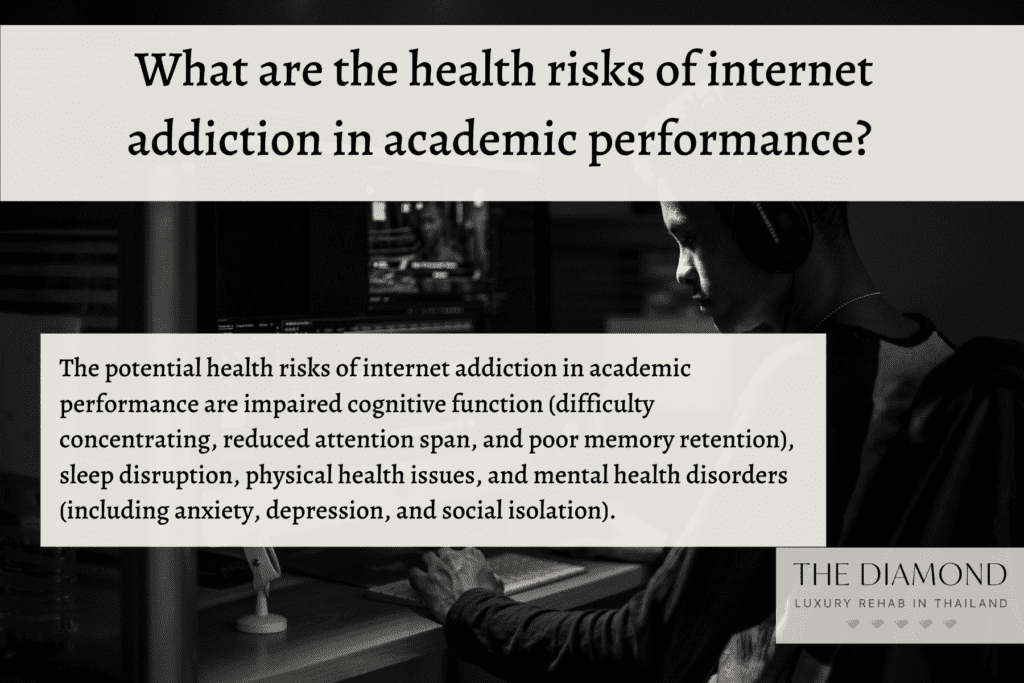Internet addiction and academic performance: causes and health risks
Table of content
- What is internet addiction?
- Why is internet addiction associated with academic performance?
- How common is internet addiction among students?
- What are the causes of internet addiction in students?

Internet addiction (IA), also known as internet dependency or problematic internet use, is the individual’s excessive and compulsive reliance on the internet to the point where it impacts daily life, including academic performance. It can manifest as an uncontrollable impulse to be online, causing a decline in academic responsibilities and performance.
The causes of internet addiction among students are social media engagement, online gaming, escapism, fear of missing out, instant gratification, lack of offline social connections, academic pressure, lack of internet literacy, low self-esteem, parental neglect, or permissiveness.
Internet addiction treatment among students involves cognitive-behavioral therapy (CBT), psychosocial interventions, family involvement, and the development of healthy coping mechanisms. Creating a balanced approach to technology use, including setting limits on screen time, encouraging offline activities, and promoting healthy study habits, also proves to be effective mechanisms for preventing internet addiction among students.
The symptoms of internet addiction that can detrimentally affect academic performance include procrastination, reduced attention span, decreased motivation for studying, and poor time management. Students with internet dependency may find it challenging to concentrate on their coursework, leading to lower grades and poor academic performance.
What is internet addiction?
Internet addiction is a psychological phenomenon characterized by excessive, compulsive, and uncontrolled internet use. Such behavior leads to negative consequences in various areas of an individual’s life, such as social relationships, work or school performance, and overall well-being. It’s important to note that not all internet use indicates addiction; it becomes problematic when it interferes with daily life and responsibilities.
According to Caroline Flisher’s 2010 article titled “Getting plugged in: An overview of Internet addiction” in the Journal of Paediatrics and Child Health, the term “internet addiction” was initially introduced by renowned psychiatrist Dr. Ivan Goldberg in 1995, who referred to it as “internet addiction disorder.”
That same year, research conducted by Dr. Kimberly Young included a sample of 500 people who exhibited significant levels of online engagement. The researcher analyzed the participants’ behavior, specifically examining how it aligned with the Diagnostic and Statistical Manual of Mental Disorders (DSM-4) criteria for pathological gambling. This groundbreaking research provided insights into the possible compulsive characteristics of excessive internet use and its similarities to recognized diagnostic criteria for other addictive behaviors.
Despite the fact that computer addiction has detrimental effects on an individual’s mental health, gambling disorder is the only behavioral addiction included in the DSM-5, as stated in the 2013 issue of the American Psychiatric Association titled “Internet Gaming”.
Why is internet addiction associated with academic performance?

Internet addiction is associated with poor academic performance due to its negative impact on cognitive functions, time management, and focus. Excessive internet use, particularly on social media and entertainment platforms, disrupts learning routines, reduces study time, and impairs concentration, leading to lower academic achievements. These cognitive deficits directly affect an individual’s mental health and ability to comprehend and retain educational material, resulting in lower academic performance.
As per the 2016 issue of the European Journal of Public Health, titled “Association between problematic internet use, socio-demographic variables, and obesity among European adolescents”, there is a connection between problematic internet use and decreased academic performance, as constant switching between different online activities negatively impacts cognitive performance.
How does internet addiction affect students’ academic performance?
Internet addiction affects students’ academic performance through the factors listed below.
- Decreased focus and attention: Decreased focus and attention is the diminished ability to concentrate on tasks or maintain sustained attention due to excessive internet use. Internet addiction can lead to this issue by constantly diverting an individual’s attention from the allure of online activities, notifications, and distractions, making it challenging to focus on essential responsibilities like school or work.
- Procrastination: Procrastination is the delaying or postponing of tasks or responsibilities, often choosing immediate pleasure or distraction over important work. Excessive internet use leads to procrastination in completing assignments and studying. Urgent academic tasks take a back seat to online activities, resulting in inefficient or incomplete work.
- Reduced study time: Reduced study is when students prioritize online activities over academic responsibilities. The internet distracts students from their academic responsibilities. This decreased focus on studying results in lower academic performance and hinders educational progress.
- Poor time management: Poor time management refers to the inability to effectively allocate and utilize one’s time to meet responsibilities, tasks, and goals efficiently. Internet addiction can lead to poor time management by causing individuals to lose track of time while engaging in excessive online activities, neglecting important tasks, procrastinating on academic or work-related assignments, and prioritizing internet use over other essential responsibilities.
- Sleep disruption: Sleep disruption refers to disturbances in an individual’s standard sleep patterns, which can result in difficulties falling asleep, staying asleep, or experiencing restful sleep. Sleep deprivation impairs cognitive function and diminishes students’ capacity to perform well academically.
- Increased stress and anxiety: Increased stress and anxiety refer to heightened emotional states characterized by worry, tension, and unease. Internet addiction can increase stress and anxiety by creating a cycle of dependency and negative emotions.
- Limited cognitive development: Limited cognitive development refers to a condition in which an individual’s cognitive abilities, including critical thinking, problem-solving, and decision-making, do not fully develop as expected for their age or stage of development. Internet addiction can contribute to this condition by diverting time and mental energy away from activities that promote cognitive growth, such as reading, studying, and engaging in face-to-face social interactions.
How common is internet addiction among students?
The prevalence of internet addiction is typically higher among adolescents and young individuals compared to older age groups, with nearly 50% of individuals aged 14–15 admitting to struggling with it, as per the 2022 issue of the American Addiction Centers titled “How common Is having an Internet Addiction?”. Additionally, 15% of those surveyed admitted to taking an internet-connected device to bed, with female participants tending to use it for social media interaction and browsing, while male participants exhibited a stronger inclination to employ it for gaming activities.
The 2018 issue of the Industrial Psychiatry Journal titled “A study on Internet addiction and its relation to psychopathology and self-esteem among college students” revealed that approximately 39.5% of students exhibited high internet usage, while about 31.5% engaged moderately. Students who were heavy internet users (used the internet for a maximum of 3–4 hours per day) could not fulfill their responsibilities, such as focusing on their studies and avoiding social isolation. Such students experienced academic, interpersonal, economic, occupational, and addictive behaviors.
Similarly, students make up the largest demographic of internet users in China, with around 183 million students aged 6–18, as reported in the 2020 Statistical Report on Internet Development in China. Due to the higher prevalence rates in China and the gravity of this issue, the country officially acknowledged internet addiction as a disorder in 2008.
What are the causes of internet addiction in students?
The causes of internet addiction in students are listed below.
- Social media engagement: Social media engagement refers to the interaction on social media platforms, such as liking, commenting, and sharing. It can contribute to internet addiction in students by promoting constant connectivity, employing reward mechanisms that trigger dopamine release, fostering a fear of missing out, and encouraging compulsive internet use to stay connected and informed.
- Online gaming: Online gaming involves playing video games over the internet, often with other players worldwide. It can lead to internet addiction among students as they become excessively engrossed in gaming, prioritizing it over academic responsibilities, social interactions, and other essential activities.
- Escapism: Escapism is the psychological tendency to seek distraction or relief from the obligations of the real world, typically through excessive internet use, video gaming, or binge-watching. In the context of internet addiction, students may turn to online activities to escape academic stress, social pressures, or other challenges in their lives.
- Fear of missing out (FOMO): FOMO is a psychological phenomenon where individuals experience anxiety or distress over the possibility of missing out on social events, experiences, or information. FOMO can result in excessive internet use among students anxious about missing out on online social interactions, news, trends, or academic resources and incessantly checking social media, emails, and websites, ultimately fostering internet addiction.
- Instant gratification: Instant gratification refers to quick and immediate online rewards, such as likes, comments, and notifications, which leads to a dopamine-driven cycle of checking and engagement. This constant quest for instant gratification can result in reduced attention spans, decreased productivity in academic and real-world tasks, and a growing sense of dependency on virtual validation.
- Lack of offline social connections: Lack of offline social connections is the insufficient or strained offline social relationships that push individuals to seek companionship and relations primarily through online interactions. This can lead to internet addiction in students as they turn to online platforms and virtual relationships to compensate for the absence of in-person social connections
- Academic pressure: Academic pressure refers to the stress and expectations students often experience in their educational pursuits. Students may turn to the internet as a means of retreat or procrastination from their academic responsibilities, which can lead to internet addiction.
- Lack of internet literacy: Lack of internet literacy refers to a limited understanding of using the internet safely and responsibly. It causes internet addiction by making students more susceptible to excessive internet usage, as they may not recognize the signs of addiction, engage in risky online behavior, or effectively manage their online time, leading to increased dependence on the internet for various activities.
- Low self-esteem: Low self-esteem is a person’s negative perception of themselves, resulting in feelings of inadequacy and low self-worth. It can contribute to internet addiction in students by making them more susceptible to using the internet for escapism, seeking validation, or comparing themselves to others online, temporarily boosting their self-esteem.
- Parental neglect or permissiveness: Parental neglect or permissiveness refers to insufficient parental supervision or excessively permissive parenting practices. This can contribute to internet addiction by allowing excessive and unsupervised access to the internet and digital devices, fostering addictive online behaviors.
What are the impacts of internet addiction on academic performance?
The impacts of internet addiction on academic performance are listed below.
- Reduced focus: Reduced focus refers to a diminished ability to concentrate on tasks or activities. Internet addiction can incessantly distract individuals, compelling them to compulsively check their smartphones, disrupting their ability to focus on vital tasks, work, or real-life interactions.
- Procrastination: Procrastination is putting off or avoiding work in favor of more enjoyable activities. Addiction to the internet prevents one from completing schoolwork and learning.
- Decline in study time: A decline in study time is the reduced time individuals spend on academic or educational activities. Internet addiction can negatively impact study time by diverting individuals’ attention away from their studies and leading to excessive time spent on online activities.
- Poor time management: Poor time management refers to the inability to prioritize tasks and allocate sufficient time to complete them efficiently. Internet addiction can exacerbate poor time management by causing individuals to spend much time online, often at the expense of essential responsibilities and tasks.
- Distraction : Distraction refers to the difficulty students face maintaining concentration in their classes due to online activities and digital content. Internet addiction contributes to distraction as students habitually monitor social media, respond to notifications, or engage in online entertainment when they should be studying or completing assignments. This consistent distraction from academic responsibilities reduces productivity and makes it difficult to focus on studies.
- Decline in grades: A decline in grades refers to decreased academic performance or achievement. Internet addiction can negatively impact grades by consuming excessive time that could be spent studying, leading to distractions, procrastination, and a lack of concentration on academic obligations.
What is the long-term impact of internet addiction on academic performance?
The long-term impacts of internet addiction on academic performance encompass reduced study time, compromised cognitive abilities, hindered information retention, disrupted concentration, impaired critical thinking, and increased susceptibility to mental health issues.
A study conducted by Kuss, D.J., and Griffiths, M.D., on Online gaming addiction in adolescence in the Journal of Behavioural Addiction in 2012 found that internet addicts spend less time on academic tasks compared to non-addicted individuals, resulting in incomplete assignments, missed lectures, and ineffective exam preparation.
In a more recent study titled “Predictive Effect of Internet Addiction and Academic Values on Satisfaction With Academic Performance Among High School Students in Mainland China” published in Frontiers in Psychology in 2021, researchers indicated that excessive internet use not only causes disrupted concentration but also shapes students’ academic values and cognitive abilities, consequently affecting their motivation and overall satisfaction with academic accomplishments.
Does too much internet use affect academic performance?
Yes, too much internet use can affect academic performance. As per a research paper titled “Exploring the impact of internet addiction on academic achievement”, published in the European Journal of Education Studies in 2017, there is a significant correlation between excessive internet use and a decline in academic achievement. Students with IA proved to have lower academic performance and overall lower grades in education.
What are the online activities that lead students to internet addiction?
Online activities that can lead students to internet addiction include excessive use of social media platforms, online gaming, streaming videos, and compulsive browsing.
According to the 2014 issue of Computers in Human Behavior titled “Exploring the effects of demographic factors, Internet usage, and personality traits on Internet addiction in a sample of Italian university students”, there is a positive link between heavy social media use and internet addiction among college students. Continually checking notifications and updates and comparing oneself to others can contribute to addictive behaviors.
Online gaming can also lead to internet addiction among students. These games often provide a sense of achievement, competition, and social interaction. According to a local study in the Philippines “Effects of online gaming addiction towards students,” published on the government site Sulong Udyong in 2022, mostly students turn to online games for stress relief; however, excessive use of online games results in diminished learning ability, difficulties in focusing, poor academic achievements, and reduced social engagement with others.
The availability of online streaming platforms like YouTube, Netflix, and Twitch can also contribute to internet addiction in students. Endless scrolling through websites, news feeds, and random content on the internet leads to compulsive browsing and internet addiction. Students might find it challenging to control their urge to check for new information or entertainment constantly.
These activities often offer instant gratification, engagement, and an escape from real-world challenges, making them appealing to students. However, when these activities start to interfere with academic performance, daily responsibilities, and overall well-being, they indicate the presence of internet addiction.
What are the health risks of internet addiction in academic performance?

The potential health risks of internet addiction in academic performance are impaired cognitive function (difficulty concentrating, reduced attention span, and poor memory retention), sleep disruption, physical health issues, and mental health disorders (including anxiety, depression, and social isolation).
Psychological challenges, such as anxiety, depression, and social isolation, can profoundly impact a student’s motivation, self-esteem, and ability to engage effectively in their academic pursuits. As per the 3rd issue of Computers in Human Behavior journal “Internet addiction in students: Prevalence and risk factors”, published in 2013, the psychological and developmental aspects linked with early adulthood might play a role in the attraction that the internet holds for students. This phase involves the formation of their self-identities and the initiation of close personal relationships.
Moreover, the lack of meaningful social connections can lead to feelings of loneliness and detachment, which can negatively influence a student’s mental and emotional well-being, motivation, and mental resilience, ultimately affecting their academic engagement.
Internet addiction and health risks, leading to poor academic performance, create a complex web of challenges that entangle students struggling to maintain focus, well-being, and the drive to excel.
IA often leads to disrupted sleep patterns. Spending late hours online or engaging in online activities that stimulate the brain can interfere with regular sleep schedules. Sleep deprivation can impair cognitive abilities, mood regulation, and overall academic performance. Eyestrain, headaches, neck and back pain, and carpal tunnel syndrome are potential physical risks for academic performance. These health issues can lead to discomfort and distract students from focusing on their studies.
How to overcome internet addiction in academic performance?
Overcoming internet addiction in academic performance requires a combination of strategies and lifestyle changes that are listed below.
- Time management: Time management means developing a structured schedule that allocates specific time blocks for studying, internet use, and leisure activities.
- Practice mindfulness: Mindfulness techniques, such as meditation, help individuals increase self-awareness and regain control over online habits.
- Limit social media engagement: Setting specific times for checking social media and limiting the duation of visits will help prevent excessive scrolling and more focus on studies.
- Offline study tools: Offline study tools are textbooks, printed articles, and physical notes. Including them in one’s study routine will decrease reliance on online resources or devices.
- Prioritize tasks: Prioritizing tasks means focusing on the most critical tasks first and tackling them before allowing oneself to engage in internet activities.
- Seek social support: Social support refers to reaching out to friends, family, or support groups for emotional or practical help and guidance when facing internet-related challenges, such as addiction or negative online experiences.
- Digital detox periods: Digital detox periods refer to intentional breaks from using digital devices and the internet. These breaks can help individuals overcome internet addiction and reduce the adverse effects of excessive screen time.
- Engage in physical activities: Engaging in physical activities involves incorporating regular exercise into one’s daily routine. It helps overcome excessive internet use by promoting physical health, reducing sedentary behavior, and providing a healthier alternative to spend time.
- Hobbies and interests: Hobbies and interests are the activities that individuals engage in for enjoyment and personal fulfillment outside of their work or daily responsibilities. They can help overcome internet addiction by providing a healthy and engaging alternative to excessive online browsing.
- Professional help: Professional help refers to seeking assistance from trained therapists, counselors, or addiction specialists to address and overcome internet addiction by providing individuals with personalized strategies, coping mechanisms, and support on how to overcome internet addiction effectively.
- Stay informed: Staying informed refers to staying up-to-date with relevant news and information. Education about the negative impacts of internet addiction on academic performance will increase one’s determination to overcome it.
What is the treatment of internet addiction in academic performance?
The treatment of internet addiction concerning academic performance typically involves CBT, psychosocial interventions, family involvement, and the development of healthy coping mechanisms. Academic counseling and time management skills are also commonly employed to improve study habits and time allocation. The effectiveness of such treatment depends on various factors, including the severity of the addiction, the individual’s willingness to change, and the specific interventions used.
In her article on internet addiction titled “Treatment Outcomes Using CBT-IA with Internet-Addicted Patients,” published in the 2013 issue of the Journal of Behavioral Addictions, Young KS recommended cognitive-behavioral therapy as a practical approach for addressing internet addiction, drawing from its proven effectiveness in treating similar impulse control disorders.
Due to the widespread use of the internet and technology, a specialized form of cognitive-behavioral therapy known as cognitive-behavioral therapy for internet addiction (CBT-IA) has been developed. The study involved clients participating in twelve weekly CBT-IA sessions. The effects of the treatment were assessed at the end of the twelve-week program as well as at one month, three months, and six months post-treatment. According to the study’s findings, over 95% of clients reported effective symptom management after the initial twelve weeks, and an impressive 78% sustained their recovery even six months after completing the treatment
In the 2018 issue of the Indian Journal of Psychiatry, within the article titled “Psychosocial Interventions for Technological Addictions,” the authors discuss the favorable outcomes associated with psychosocial interventions. The term “psychosocial interventions” encompasses a wide range of approaches, including diverse forms of psychotherapy (such as psychodynamic therapy, cognitive-behavioral therapy, interpersonal psychotherapy, and problem-solving therapy), community-based treatments (like assertive community treatment and interventions for first episode psychosis), vocational rehabilitation, peer support services, and integrated care methods.
Incorporating families into the treatment of IA has proven to be effective and has given favorable results, claim the authors of the article “Qualitative Study of Practitioners’ Views on Family Involvement in the Treatment Process of Adolescent Internet Addiction” in the 2020 issue of the International Journal of Environmental Research and Public Health. The requirements of adolescents struggling with IA and their family members are met through personalized counseling for the adolescents and informative sessions for the family members. Collaborative therapy sessions proved to promote productive communication, enhance family dynamics and operations, and mend relationships.
Is monitoring internet usage effective in reducing internet addiction?
Yes, monitoring internet usage can be effective in reducing internet addiction. Monitoring involves keeping track of the time spent online by regularly assessing one’s internet habits, becoming more conscious of their behavior, and making wiser choices about how they use the internet.
Monitoring internet usage can be especially relevant when considering mental health conditions like anxiety, depression, and other mood disorders. Monitoring internet usage can help individuals recognize patterns that trigger their anxiety and enable them to set limits on activities that contribute to their stress.


